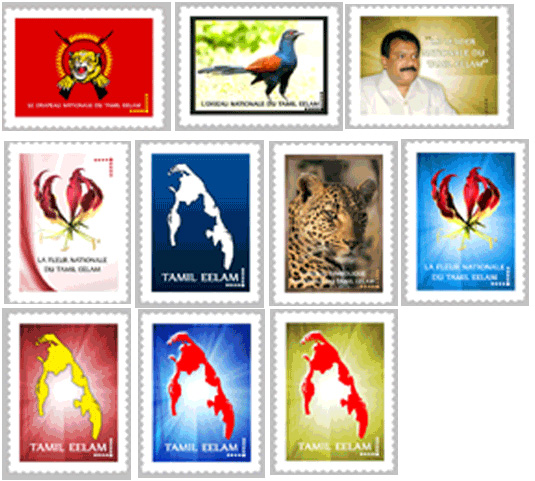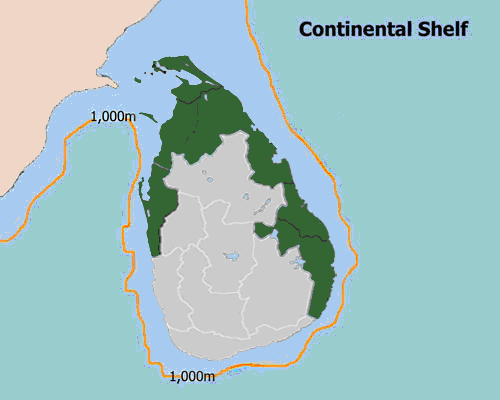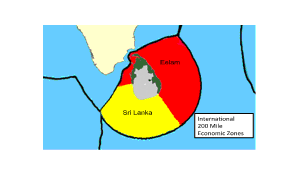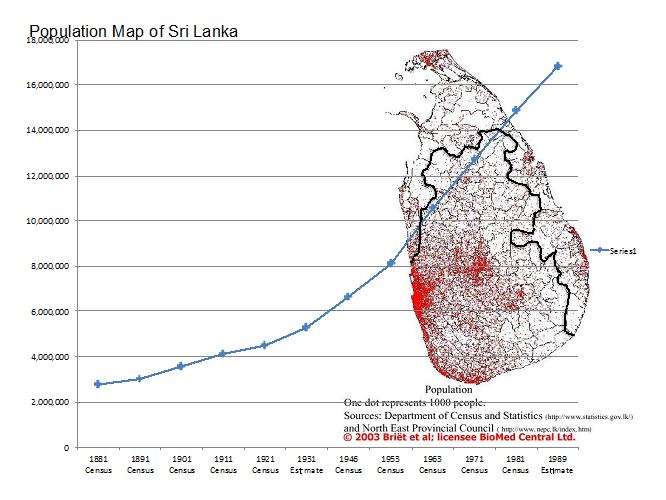13th Amendment – Consult the People at a Referendum!
Posted on July 19th, 2013
Ratanapala
ƒÆ’-¡ƒ”š‚ With Eelam – a Thousand Mavil Arus and unending war beginning with water wars across an undefined border!
ƒÆ’-¡ƒ”š‚ After 30 years of war we are happy to witness Sri Lankans enjoying the fruits of peace in our island nation and the unprecedented development that is taking place throughout Sri Lanka. Four years have gone by and not a single terrorist event has taken place since the dawning of peace. However the remnants of the LTTE Terrorist movement in Sri Lanka and abroad (the so called Tamil Diaspora) are still active and working vigorously to promote the dismemberment of Sri Lanka with the help of outside forces. Time has come for Sri Lanka to take an assertive role in confronting all forces inimical to its existence.
Sri Lanka needs to consider what would happen once the powers are devolved ƒÆ’‚¢ƒ¢-¡‚¬ƒ¢¢”š¬…” the day after ƒÆ’‚¢ƒ¢-¡‚¬ƒ¢¢”š¬…” a week after ƒÆ’‚¢ƒ¢-¡‚¬ƒ¢¢”š¬…” a month after ƒÆ’‚¢ƒ¢-¡‚¬ƒ¢¢”š¬…” a year later. We need to pre-empt likely scenarios that can develop knowing well the mindset and agenda of the TNA, the Tamil diaspora,ƒÆ’-¡ƒ”š‚ India and the Christian Western Powers. We need to consider what would happen if land and police powers are devolved to the Northern Province.
Eelam dream in 1980ƒÆ’-¡ƒ”š‚ ƒÆ’-¡ƒ”š‚ ƒÆ’-¡ƒ”š‚ ƒÆ’-¡ƒ”š‚ ƒÆ’-¡ƒ”š‚ ƒÆ’-¡ƒ”š‚ ƒÆ’-¡ƒ”š‚ ƒÆ’-¡ƒ”š‚ ƒÆ’-¡ƒ”š‚ ƒÆ’-¡ƒ”š‚ ƒÆ’-¡ƒ”š‚ ƒÆ’-¡ƒ”š‚ ƒÆ’-¡ƒ”š‚ ƒÆ’-¡ƒ”š‚ ƒÆ’-¡ƒ”š‚ ƒÆ’-¡ƒ”š‚ ƒÆ’-¡ƒ”š‚ ƒÆ’-¡ƒ”š‚ ƒÆ’-¡ƒ”š‚ ƒÆ’-¡ƒ”š‚ ƒÆ’-¡ƒ”š‚ ƒÆ’-¡ƒ”š‚ ƒÆ’-¡ƒ”š‚ ƒÆ’-¡ƒ”š‚ ƒÆ’-¡ƒ”š‚ ƒÆ’-¡ƒ”š‚ ƒÆ’-¡ƒ”š‚ ƒÆ’-¡ƒ”š‚ EelamƒÆ’-¡ƒ”š‚ dream in 2008
ƒÆ’-¡ƒ”š‚ Presently the implementation of the provisions of the 13th Amendment to the Northern Province ofƒÆ’-¡ƒ”š‚ Sri LankaƒÆ’-¡ƒ”š‚ is under scrutiny. We know that the 13th Amendment to the Sri Lanka Constitution came into effect on14 November 1987, subsequent to the signing of the Indo- Lanka Accord on 29 July 1987. This led to the Provincial Councils Act and the establishing of Provincial Councils thereafter with the intention of devolving powers to the people at grassroots level.
All the proposals in that agreement which the then President J. R. Jayewardene signed under duress were made ƒÆ’‚¢ƒ¢-¡‚¬ƒ”¹…”conditional to the Government of India taking the following actions if any militant groups operating in Sri Lanka do not accept this framework of proposals for a settlement, namelyƒÆ’‚¢ƒ¢-¡‚¬ƒ¢-¾‚¢:
(A) India will take all necessary steps to ensure that Indian territory is not used for activities prejudicial to the unity, integrity and security of Sri Lanka. [Indian soil continued and continues to this day to be used for anti-Sri Lankan activities.]
ƒÆ’-¡ƒ”š‚ (B) The Indian Navy/Coast Guard will cooperate with the Sri Lankan Navy in preventing Tamil militant activities from affecting Sri Lanka. [This pledge was reneged on and the Sri Lanka Navy curbed LTTEƒÆ’‚¢ƒ¢-¡‚¬ƒ¢-¾‚¢s maritime activities almost single-handedly.]
ƒÆ’-¡ƒ”š‚ (C) In the event that the Government of Sri Lanka requests the Government of India to afford military assistance to implement these proposals the Government of India will cooperate by giving to the Government of Sri Lanka such military assistance as and when requested. [The forcibly inducted Indian army failed to contain the LTTE.]
ƒÆ’-¡ƒ”š‚ (D) The Government of India will expedite repatriation from Sri Lanka of Indian citizens to India who are resident there concurrently with the repatriation of Sri Lankan refugees from Tamil Nadu. [Nothing of the sort has happened.]
ƒÆ’-¡ƒ”š‚ (E) The Governments of Sri Lanka and India will cooperate in ensuring the physical security and safety of all communities inhabiting the Northern and Eastern Provinces. [India failed to do so and the LTTE carried out a countless number of massacres of civilians and ethnically cleaned the Northern Province. Sri Lanka had to neutralise the LTTE on its own.]
ƒÆ’-¡ƒ”š‚ Above all, the annexure to the Indo-Lanka accord said, inter alia: “The President of Sri Lanka and the Prime Minister of India agree that the Tamil militants shall surrender their arms to authorities agreed upon to be designated by the President of Sri Lanka. The surrender shall take place in the presence of one senior representative each of the Sri Lankan Red Cross and the Indian Red Cross.” [India miserably failed to disarm the LTTE and left North Eastern land robbed, raped, devastated and in disarray.]
ƒÆ’-¡ƒ”š‚ Indo Sri Lanka Accord while acknowledging that Sri Lanka is a ƒÆ’‚¢ƒ¢-¡‚¬ƒ¢¢”š¬…” multi-ethnic, multi-lingual plural society consisting, inter alia, of Sinhalese, Tamils, Muslims (Moors) and Burghers, unilaterally recognized that the Northern and Eastern Provinces as areas of historical habitation of Sri Lankan Tamil speaking peoples.ƒÆ’-¡ƒ”š‚ This single sentence ended up contradicting itself by giving special status to Tamils while acknowledging that Sri Lanka is a ƒÆ’‚¢ƒ¢-¡‚¬ƒ¢¢”š¬…” multi-ethnic, multi-lingual plural society. This biased position is deeply hurtful to the Sinhala people and goes contrary to the known history and archaeology of these two provinces.
ƒÆ’-¡ƒ”š‚ ƒÆ’-¡ƒ”š‚ ƒÆ’-¡ƒ”š‚ ƒÆ’-¡ƒ”š‚ ƒÆ’-¡ƒ”š‚ ƒÆ’-¡ƒ”š‚ ƒÆ’-¡ƒ”š‚ ƒÆ’-¡ƒ”š‚ ƒÆ’-¡ƒ”š‚ ƒÆ’-¡ƒ”š‚ ƒÆ’-¡ƒ”š‚ ƒÆ’-¡ƒ”š‚ ƒÆ’-¡ƒ”š‚ ƒÆ’-¡ƒ”š‚ ƒÆ’-¡ƒ”š‚ ƒÆ’-¡ƒ”š‚ ƒÆ’-¡ƒ”š‚ ƒÆ’-¡ƒ”š‚ ƒÆ’-¡ƒ”š‚ ƒÆ’-¡ƒ”š‚ ƒÆ’-¡ƒ”š‚ ƒÆ’-¡ƒ”š‚ ƒÆ’-¡ƒ”š‚ ƒÆ’-¡ƒ”š‚ ƒÆ’-¡ƒ”š‚ ƒÆ’-¡ƒ”š‚ ƒÆ’-¡ƒ”š‚ ƒÆ’-¡ƒ”š‚ ƒÆ’-¡ƒ”š‚ ƒÆ’-¡ƒ”š‚ WhitherƒÆ’-¡ƒ”š‚ Sovereignty?
ƒÆ’-¡ƒ”š‚ It is time to take note with deep concern, that whilst Sri Lanka has made all efforts practically possible to keep to the letter and spirit of the Indo Sri Lanka accord, India has failed to live up to the provisions of the accord which it promised to uphold. It famously failed to disarm the LTTE terrorists and continued to provide safeƒÆ’-¡ƒ”š‚ havens for the LTTE brigands in her territory. When Sri Lanka asked for assistance India famously declined such assistance on a number of occasions. As such Indo Sri Lanka Accord, whilst still existing on paper, it stands defunct and abrogated in the conscience of every true-blooded Sri Lankan.ƒÆ’-¡ƒ”š‚ It is time Sri Lanka abrogated and cast aside this unwanted, unsolicited bundle of Indian excrement.
The accord, which led to the addition of the 13th Amendment to the Constitution of Sri Lanka, was not a democratic expression of the people of Sri Lanka and resulted in widespread discontent in the island at the time of its imposition ƒÆ’‚¢ƒ¢-¡‚¬ƒ¢¢”š¬…” scores were killed. This unwanted and unsolicited intrusion stands as a slur on the spirit, pride and will of our nation.
While the 13th Amendment was meant for the devolution of power to the North and Eastern provinces, a near senile President J R Jayewardene went into implement its provisions in the rest of the islandƒÆ’‚¢ƒ¢-¡‚¬ƒ¢-¾‚¢s seven provinces with no such calling for power devolution from the populace in these provinces.ƒÆ’-¡ƒ”š‚ ƒÆ’-¡ƒ”š‚ These provincial administrations have remained to this day as a means of providing positions of power to failed politicians as well as a means of disenfranchising the population of their democratic right to elect political leaders of their choice. The overall result has been to institutionalize corruption in an exponential scale together with additional barricades for the ordinary people at grass roots level to realize their lifeƒÆ’‚¢ƒ¢-¡‚¬ƒ¢-¾‚¢s aspirations and democratic governance.
Sri Lanka has been left holding the illegitimate child of this one sided externally imposed accord ƒÆ’‚¢ƒ¢-¡‚¬ƒ¢¢”š¬…” the 13th Amendment to the Constitution of Sri Lanka.ƒÆ’-¡ƒ”š‚ The Government of India is making use of this ƒÆ’‚¢ƒ¢-¡‚¬ƒ”¹…”AccordƒÆ’‚¢ƒ¢-¡‚¬ƒ¢-¾‚¢ as well as the 13th Amendment to keep Sri Lanka on a tight leash. It is time that Sri Lanka asserted its independence in handling matters of state. Of particular concern is the fact that India is insisting on 13th plus and more ƒÆ’‚¢ƒ¢-¡‚¬ƒ¢¢”š¬…” which is an open-ended statement that will keep Sri Lanka forever and permanently tethered to the smelly Indian posterior.
It is evident from the attitude of the TNA and the statement emanating from Justice Wigneswaran ƒÆ’‚¢ƒ¢-¡‚¬ƒ¢¢”š¬…” an aspirant to the Chief Minister position of the Northern Province that they are not happy with the 13th Amendment even if it comes just as India envisaged it in 1987 (with more power even than given to any of Indian States under the Indian Constitution). If Sri Lanka decides not to do away with this draconian piece of externally imposed legislature at this point it would create conditions not retractable ever in the future.ƒÆ’-¡ƒ”š‚ Once the powers are devolved to the Northern Province there in nothing in their way to prevent them go out for UDI (Unilateral Declaration of Independence) as happened already once before with Varatharajah Perumal as the Chief Minister of the North-Eastern Provincial Council in the eighties. Once declared itƒÆ’-¡ƒ”š‚ will be immediately recognized by India, European Union and the United States of America.ƒÆ’-¡ƒ”š‚ The political equation will change overnight and a disaster not witnessed in the 2500 year old history Sri Lanka will seal the fate of future Sri Lanka for ev
ƒÆ’-¡ƒ”š‚ Loss of living space
We deem it right that what has been achieved through blood, sweat and tears, sacrifice of life and limb of our Ranaviruvoes and with the unflinching support ofƒÆ’-¡ƒ”š‚ Sri Lankan patriots who gave their sons and daughters to the war effortƒÆ’-¡ƒ”š‚ – the ordinary people of Sri Lanka, should not be bartered away posthumously for the very cause ƒÆ’‚¢ƒ¢-¡‚¬ƒ¢¢”š¬…” the cry for the separate stateƒÆ’-¡ƒ”š‚ of Tamil Eelam. All the sacrifices of the Sri Lankan nation during a period of 30 years would be in vain.
We recognize with pride that it was the Mahinda Rajapakse presidency that brought peace to Sri Lanka after 30 years of a Indian trained, Christian West Funded, racist terrorist Tamil insurrection that instilled suffering, insecurity and deep anguish in the Sri Lankan nation. We are deeply grateful to the President ƒÆ’‚¢ƒ¢-¡‚¬ƒ¢¢”š¬…” His Excellency Mahinda Rajapakse ,ƒÆ’-¡ƒ”š‚ his administration, the Defense Secretary Gotabhaya Rajapakse and the Armed Forces of Sri Lanka for bringing an endƒÆ’-¡ƒ”š‚ to the loudly proclaimed ƒÆ’‚¢ƒ¢-¡‚¬ƒ”¹…”unwinnable warƒÆ’‚¢ƒ¢-¡‚¬ƒ¢-¾‚¢. This nation is not ready to be back in that unfortunate situation, now or ever in the future. The task that is left now is to bring about the necessary ƒÆ’‚¢ƒ¢-¡‚¬ƒ”¹…”fortificationsƒÆ’‚¢ƒ¢-¡‚¬ƒ¢-¾‚¢ that would forestall such an event now or in the future.
Much has been achieved, by the President of Sri Lanka,ƒÆ’-¡ƒ”š‚ acting as a mature politician. With his vast experience in Sri Lankan and international politics it is time that he acted as a statesman and from now onwards and carryout what would be right for the future wellbeing of the nation. It took the likes of a Lee Kuan Yew and a Mahathir Mohammed to take their respective nations to what they are today. We cannot forever remain the errand boy of Indian politics. It is time for Sri Lanka to be assertive and if necessary be like Singapore to Malaysia or even North Korea to the rest of the world! We must obtain our individual identity with no attachment to our nearest neighbor and distractor ƒÆ’‚¢ƒ¢-¡‚¬ƒ¢¢”š¬…” India!
Most importantly we believe that after 26 years of the formation of the Provincial Councils under the 13th Amendment to the Sri Lankan constitution, time is opportune to carryout an assessment of the degree to which the Provincial Councils, considered by many to be proverbial white elephants, have improved the quality of life of the citizens, devolution of power and self governance of Sri Lanka. The best way to do this is to directly consult the citizens of Sri Lanka at a referendum as per the provisions of the Article 86 of the Constitution of Sri Lanka. This provides for the participation of the People of Sri Lanka in an island wide referendum to decide on matters of national importance. Accordingly it will be possible to find out first hand the efficacy of this form of power devolution. People of Sri Lanka and they alone hold the sovereignty of the nation and they should be the final arbiters of this issue. This is the best and democratic way to find a resolution to this impasse.
ƒÆ’-¡ƒ”š‚ There is no lack of ƒÆ’-¡ƒ”š‚ warnings and valuable advice from Sri Lankan patriots about the dangers of devolving powers to the Northern Province. If on the other hand the President decides to ignore all warnings and go ahead with implementing provisions of the 13th Amendment to placate the whims of India, it will not only be his folly, downfall from grace and his personal epitaph in history, but worse it will bring about the death of Sri Lanka as we know it for the last 2500 years. It will bring about blood letting in an unprecedented scale in Sri Lanka and finally the balkanization of India in the hands of the Christian West!
ƒÆ’-¡ƒ”š‚ Time is of the essence. Therefore as a first step to avert impendingƒÆ’-¡ƒ”š‚ disaster, we call upon His Excellency the President of Sri Lanka ƒÆ’‚¢ƒ¢-¡‚¬ƒ¢¢”š¬…” Mahinda Rajapakse (being mindful of the nation, its history, its culture and last but not least, all those who sacrificed with life and limb and others who helped him in various ways to save the nation during a 30 year war on Tamil Racist Terrorism and since his election to Presidency)ƒÆ’-¡ƒ”š‚ to go ahead and hold an island wide referendum to establish in clear and concise terms – ƒÆ’-¡ƒ”š‚ ƒÆ’-¡ƒ”š‚ whether ƒÆ’-¡ƒ”š‚ the establishment of the Provincial Councils as per the provisions of the 13th Amendment to the Constitution of Sri Lanka in its current format remain the best way to devolve power to the people at grassroots level, whileƒÆ’-¡ƒ”š‚ safeguardingƒÆ’-¡ƒ”š‚ the Unity, Sovereignty and Territorial Integrity of Sri Lanka and the pride of all Sri Lankans.
ƒÆ’-¡ƒ”š‚ If others cannot let the people decide!
ƒÆ’-¡ƒ”š‚






July 20th, 2013 at 3:45 am
Well said Ratanapala.
A democratic solution – REFERENDUM.
July 20th, 2013 at 11:43 am
LORENZO ! I SAID THE SAME THING IN AN ARTICLE ON JUNE 18th, 2013. How many people have said this on Lanka Web. It appears that all our cries will be in vain.
July 20th, 2013 at 1:30 pm
Thank you, Ratanapala. We appreciate the article very much and the effort of producing the maps.
Referendum a must – as to when this will happen, no one knows. Govern well or lose the land.
July 20th, 2013 at 7:38 pm
I have submitted the following as a stand-alone Article to be published at LankaWeb. I am presenting it here as a comment because the issue is important and needs to be urgently addressed.
…………………….
STOP the PC Elections NOW: Census 2012 Data Shows Massive ILLEGAL IMMIGRATION of Indian Tamils into Sri Lanka during LTTE control of the North & East in the last 30 years!
By Ananda-USA
July 18, 2013
The 2012 Census indicates NO REDUCTION in the Tamil Population of Sri Lanka, after allowing for the net natural population increase due to more births than deaths.
If 1.5 million Sri Lankan Tamils EMIGRATED, legally and illegally, to foreign countries, over the last 30 years, and many of them currently hold Sri Lankan passports, why is the EXPECTED REDUCTION in Sri Lankan Tamil population not reflected in the 2012 Census figures?
The only possible explanation is that during the Eelam War years about 1.6 MILLION Indian Tamils illegally entered Sri Lanka with the connivance of the LTTE and Tamil Nadu.
Were the 300,000 Tamils herded by the LTTE as a “human shield” actually some of the ILLEGAL Indian Tamil Immigrants brought into Sri Lanka who would be DEPORTED back to India if the SECRET of their ILLEGAL Immigration status was revealed? Were they WILLING participants in the human shield for that reason?
The article below by IRIN bemoans the difficulties faced by “war returnees” due to the lack of National ID cards, The reason why they don’t have Sri Lankan National ID cards may be because many of them are ILLEGAL IMMIGRANTS who were never citizens of Sri Lanka, and NEVER HAD Sri Lankan National ID cards issued to them.
This should be INVESTIGATED IMMEDIATELY by the Government of Sri Lanka to IDENTIFY and DEPORT these 1.6 Million ILLEGAL IMMIGRANTS from Sri Lanka, as soon as possible! No National ID cards should be issued until the legal citizenship status is established through detailed background investigations.
Now it becomes clear why the TNA, the Tamil Nadu Politicians, and the Government of India are in SUCH A HURRY to hold Provincial Councils Elections and install the TNA in the Provincial Government, and Devolve Police and Land powers to them.
If the TNA is endowed with Police & Land Powers, they can easily FALSIFY REGISTRATION RECORDS, issue documents certifying Sri Lankan citizenship to these ILLEGAL IMMIGRANTS, and COVER UP the MASSIVE ILLEGAL IMMIGRATION that has taken place!
If this MASSIVE Immigration SCAM is allowed to take effect, the DEMOGRAPHICS of Sri Lanka would change INSTANTLY to favor the Tamil Community, with the induction of 1.6 MILLION new citizens!
Until this ISSUE IS RESOLVED, NO PC ELECTIONS should be held, and NO POWER should be DEVOLVED to these CROOKS! DO NOT ISSUE PERMITS to Illegal Immigrants that allow them to to vote in Provincial or National Elections; that will give them another official document to buttress their claim to citizenship.
There is NO ISSUE OF GREATER IMPORTANCE to Sri Lanka’s National Security than the protection of the legal status of native Sri Lankans by keeping illegal immigrants out of Sri Lanka.
STOP THE PC ELECTIONS … NOW!
……………
No ID, no security, the dilemma of Sri Lanka’s returnees
ColomboPage News Desk, Sri Lanka.
July 17 (IRIN) COLOMBO- Close to 100,000 returnees in Sri Lanka’s north lack national identity cards (NICs), more than four years after the end of the country.s decades-long civil war.
“Many people cannot resume their lives as NICs are the passport to accessing multiple services and were made mandatory for voting in 2006,” Suresh Premachandran, a member of parliament (MP) with the Tamil National Alliance, one of the largest national parties representing minority Tamils from the north, told IRIN.
According to the United Nations, more than 460,000 displaced persons have returned to Northern Province – which is home to more than 1 million inhabitants – since government forces declared victory over the Liberation Tigers of Tamil Eelam (LTTE), who had been fighting for an independent Tamil homeland since 1983.
In Mullaitivu and Kilinochchi districts alone, an estimated quarter of the districts’ 200,000-plus inhabitants are without national IDs.
Without such documentation, many residents struggle to access public services such as health and education, and well as government assistance programmes.
They also face the risk of questioning and delays by police and security officials.
Not a priority
Under the law, NICs are compulsory for all Sri Lankans 16 years or older, and authorities may detain suspicious individuals who fail to show any form of legal identification – a legacy of the war.
“Without an NIC, you are always at risk,” said Shereen Xavier, a north-based lawyer and executive director of the Home for Human Rights (HHR). “Without it, the impediments can be many.”
Even to enter many government buildings, one must produce an NIC, people complain.
But moving ahead on this issue is proving a challenge.
Despite the identity cards’ importance, the government has yet to prioritize the issue, with much of its effort focused instead on large-scale infrastructure and development projects in the north.
Many returnees do not have the required documentation to apply for an NIC, and with no local offices for issuing NICs, applications can take several months to process.
“The processing of papers can prove time-consuming,” Shanthi Sachithanandan, chairperson of Viluthu, an organization promoting good governance in the north, explained.
Temporary IDs
After the war, the government was keen to have its voter lists updated.
When these lists were updated ahead of presidential and local polls in 2010 and 2012, temporary IDs were issued to over 40,000 people to allow them to vote, a process that continues today.
At that time, around 90,000 people from the north failed to indicate their NIC number, Deputy Elections Commissioner M.M. Mohammad confirmed.
“Temporary IDs were issued to many, especially to facilitate their participation in the presidential and local government elections that were held,” he said.
But many returnees say such IDs are looked down upon. Those holding temporary ID have difficulty accessing government services and are sometimes treated with suspicion by officials, they say.
Now, with the first provincial council election in Sri Lanka’s former war zone scheduled for September, returnees and politicians alike are again urging the government to improve the issuing of NICs.
“The government has started issuing temporary IDs, which is a time-consuming process. People have to contact the local government officials and process papers, which is not easy for returnees,” MP Premachandran said.
But according to the department responsible for issuing NICs, given the amount of time and documentation it takes to process such applications outside Colombo – and specifically in the former war zone – temporary IDs may still be the best option available at this point.
“This is the best solution to the present problem,” maintained M.S. Sarath Kumara, commissioner general of the registration of persons, noting that temporary IDs issued to facilitate voting could also prove useful to people without any other form of identification.
“A temporary ID is a practical idea, and it can be revalidated through reapplication,” agreed Rohana Hettiarachchi, executive director of People’s Action for Free and Fair Elections, an election monitoring body that has been helping eligible voters to obtain national identity cards through a mobile clinic effort.
But for those returnees without an NIC, still struggling to establish some semblance of normalcy in their lives after years of conflict and displacement, the idea of anything temporary offers little solace.
“A temporary ID is useful for those who wish to cast their vote at the forthcoming northern provincial election. [However,] for us former IDPs [internally displaced persons], returning home after being displaced for a decade, there are much bigger issues than getting involved in a political battle,” explained Muttuvel Kadirmani, a 46-year-old father of three from Mullaitivu. He urged the government to issue NICs instead of temporary forms of identification.
“It will be useful in every aspect of life and provide us with a sense of security,” he said.
Read More:: IRIN (Source)